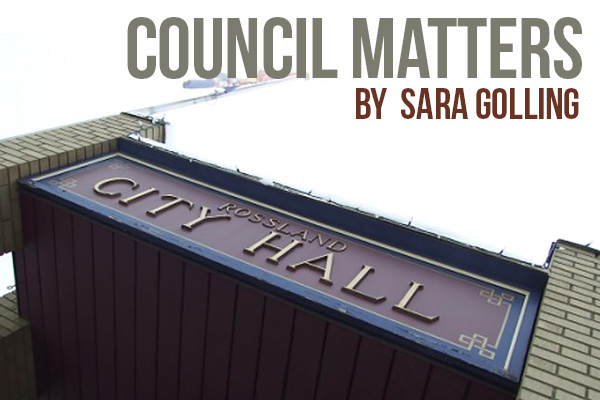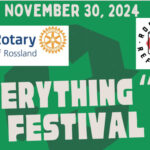Sticker Shock on Water and Sewer? Be Part of the Consultation.
Editor’s Note: These reports are intended to show readers most of what Council does in the course of the meetings, even the boring stuff — it’s all part of their job — in as unbiased a way as possible for a mere human. The next municipal election is now nearly three years away, but if you pay attention to these reports you can gradually build a picture of the different Council members’ positions on issues, and their strengths and contributions. You can take that picture into the voting booth with you in three years’ time.
Regular Meeting of Rossland City Council, September 28, 2015:
Present: Mayor Kathy Moore, Councillors Lloyd McLellan, Andy Morel, Andrew Zwicker, John Greene, Marten Kruysse.
First up were two delegations: one from the Interior Health Authority (IHA), and one from Columbia Basin Trust (CBT).
Kerri Wall, Community Health Facilitator for IHA, works with communities to develop policies that “can positively impact health.” She listed some of the factors that affect health: income, nutritious food, exercise, mental wellness, a clean environment, genetics, stress, education, and the health care system.
Wall mentioned a Cranbrook poverty reduction initiative enabling low-income people to have free bus passes. BC Transit provides the passes and the City takes care of administration. She spoke about “Plan H” that may provide funding which will be announced in 2016. She proposed an informal “partnership” with Rossland — the City receives information items, and Wall can help with funding applications for Plan H.
Kruysse noted that larger communities have more resources to take on projects. It’s a struggle for smaller places like Rossland that are strapped for cash, with overworked staff, to take part in multi-agency initiatives. Wall acknowledged the problem of downloading, and noted that she can still assist the City with some things; the City could get funding for a project, with another entity doing the work; City staff need not take on more than some administration of funding.
Morel spoke about local interest in food security, and about Rossland Society for Environmental Action as a conduit for the funding of environmental projects.
Moore pointed out that he IHA materials downplayed local government’s role in delivery of hospital services, and reported that every year the Regional Hospital Board puts two million dollars of local taxpayers’ money into reserves for health care, and in 2015 added a further 2.3 million dollars into capital for local hospitals. She estimated it at about 40% of the capital investment in local hospitals, and she really considers that to be significant downloading from the Province; “the communities could take on more projects to promote health if they could keep that money themselves.”
Kelvin Saldern, Community Liaison for CBT, presented a review of the past year: CBT delivered $22 million in programs and services. CBT currently has an investment portfolio valued at $710 million. Saldern acknowledged that CBT hasn’t been really good at measuring, evaluating, and communicating the full impacts of its beneficence, and will be working on improving that. Saldern spoke about CBT’s policy of not covering infrastructure that is the historic responsibility of any level of government; he indicated that if communities want that to change, reasoned advocacy to the CBT board could possibly bring about reconsideration. Saldern indicated that if there is innovation that takes an infrastructure project beyond the traditional responsibility of government, there may be a chance of assistance for that innovation.
Moore thanked the delegations and Council moved on to the rest of its agenda.
A motion to defer a decision on the provider of staff benefits until April 2016 CARRIED.
Street Lighting:
Interim Chief Administrative Officer Mike Maturo presented a new Street Light Policy, and recommended that Council also approve a reduction of mid-block street lighting, by disconnecting or removing lights, and also removing extra lighting at intersections lit by more than one fixture already; and when street lights are replaced, to replace them with lights that are more “dark-sky friendly” and more directional instead of shining out into people’s yards and windows. Maturo estimates that the payback period for the labour costs would be about one year, from savings on energy costs.
Kruysse raised concerns about dark areas where there is no lighting at all on some streets and pedestrians must either carry their own flashlights or headlamps or else walk in darkness; he recounted an incident when, walking home at night, he met a bear on a dark stretch of street. Kruysse recommended using a section of town as a pilot project for a plan. Greene agreed. Zwicker also agreed, though he likes the aims of the policy. Moore thought the plan should come before the policy. McLellan disagreed; said he thinks the policy should come first, and then a plan consistent with the policy. Kruysse thought street lights could be removed without any policy, but Maturo cautioned that doing such work without a policy could expose the City to liability. A motion to approve the policy with a further direction to begin removing street lights was defeated, with only McLellan in favour.
A motion to adopt the street lighting policy, amended to change the first policy objective to “safely illuminate the City of Rossland” CARRIED unanimously.
A motion to direct staff to develop a new lighting plan with public consultation CARRIED unanimously.
Permissive Tax Exemptions:
Council discussed a motion to read the Permissive Tax Exemption Bylaw 2599 for the first, second and third time. McLellan said he was not in favour of it because he thinks it is too generous; he wants to know what other communities do, and he wants to vote against it and propose a new motion. Kruysse said he was opposed to a “retail store” getting a tax exemption, because it costs the City to provide services; he was referring to the Thrift Shop, which is a charitable organization raising funds for the Hospital Auxiliary. Lois Hunter, the Acting Chief Financial Officer, explained that the Community Charter limits what can be exempted. Moore reported that the Regional District gives exemptions to golf courses. John Greene excused himself from the meeting until after this item, because he is on the board of the Rossland Light Opera Players, an applicant for permissive exemption. McLellan thought it would be really bad if we suddenly cut someone off. Council defeated the motion to pass the bylaw in the form presented.
A motion to amend the bylaw by changing it to approve the permissive tax exemption for the applicants listed for only one year, rather than three years, CARRIED unanimously.
A motion that staff investigate other communities’ permissive tax exemption policies CARRIED unanimously.
Revitalization Tax Exemptions:
Council discussed an application for a Revitalization Tax Exemption for 2105 Columbia Avenue. Kruysse clarified that the owners will be paying the current municipal taxes for a period of five years, and that the increase in property value from the renovations will not affect the municipal taxes payable during that period. Kruysse asked what the application fee is for the Revitalization Tax Bylaw; Hunter answered, $10. Kruysse thought that did not cover staff time to process the application. McLellan noted that the applicants have already paid substantial building permit fees to the City. Moore wanted to be sure that the applicants are aware that the time-limited exemption from increases based on property value applies only to the municipal portion of the total property taxes. Council discussed the fact that part of the building on Columbia is intended for residential use, as is common with many of the commercial properties downtown, and that although the bylaw is intended to encourage the improvement of commercial premises, improvements usually affect both the commercial and residential portions.
The motion to give first, second and third readings to the revitalization tax exemption bylaw # 2596, which includes both the WHC Holdings application for the new hotel at Red and also the Texas Point Holdings application for the property at 2105 Columbia Avenue downtown, CARRIED unanimously.
Proposed New Water and Sewer Charges:
Council studied and discussed the proposal for new water and sewer rates, revised since Council’s last meeting. Responding to a suggestion that seniors be given a larger discount, Hunter pointed out that the discount is $20 for water and another $20 for sewer, for a total discount of $40. Morel said he thought a discount should apply to low-income households, and should not be based on age, as some seniors are well off financially and some younger people are not; Moore agreed. Kruysse does not see why anyone at all should get a discount on a utility. Hunter mentioned that there are 94 households who have applied for and received the seniors’ discount, which costs the City a total of $3760 in revenue. Kruysse suggested that any discount should be part of a public discussion on the fees. Moore noted that we are making a “pretty substantial increase” in our rates and fees. Kruysse asked how the discount would be administered; how can the City determine people’s ability to pay? Hunter said the seniors’ discount is not a problem to administer because it is based on households eligible for the seniors’ homeowners’ grant, but it would be nearly impossible to discern who had a small income and large assets.
The motion to give first and second readings to the water rate bylaw CARRIED unanimously.
On the motion to give first and second reading to the sewer rates bylaw, Moore asked why the materials listed no sewer charge at all for un-metered properties. Hunter indicated that the charge on un-metered properties would go from $301 to $607 for sewer service. The motion CARRIED unanimously, subject to those amounts being filled in.
A motion that the City undertake a public engagement process on the proposed new water and sewer rate bylaws, and that the City should contact and invite those who are especially affected by the rate changes, CARRIED unanimously.
The Loan for the Washington Street Project:
A motion that Council approve the Alternative Approval Process Calendar, which lays out the timeline for the approval process, for the Loan Authorization for the Washington Street infrastructure renewal project CARRIED unanimously. The calendar, as presented, is required by law.
Then Council discussed which form of materials to use for enabling residents to file an objection to the Washington Street loan: Moore said she preferred the simpler Option 2. Zwicker wanted to ensure that the material showed what the effect of the maximum amount of borrowing on an average household could be if it were recovered as a tax increase; Kruysse objected to this, as the City hasn’t decided yet how to recoup the amount of the debt and may not do it through taxes. Hunter suggested that Council vote on the option, and then decide what to add into it.
After defeating a motion to use Option 1, Council passed a motion to use Option 2, with the addition of the impact per average household of the maximum amount of debt being authorized (which may not all be used), and a slight change in wording to make it clear that Council wants to know how many people are opposed to the loan. This process is not for collecting opinions on other aspects of the project.
Another legally required step in the process, a motion that Council approve the determination that the number of electors in Rossland is 2712, CARRIED unanimously.
At earlier meetings, the Financial Plan Amendment Bylaw #2598 received first, second and third readings. At this meeting, a motion to adopt the bylaw CARRIED unanimously.
Correspondence:
Council received a letter from the Kootenay Columbia Trails Society (KCTS) suggesting that City investigate ways to recognize the contributions of property owners who allow trails to cross their property, especially the owners of private managed forests. He pointed out that they recieve no compensation for the public good they contribute, and incur “increased management complexity and costs associated with addressing the implications of public access to their legal liability”. Council discussed the benefits and the difficulties involved, and a motion to respond to the letter CARRIED. Moore suggested including the City’s great appreciation for the owner’s contributions, and for KCTS’s work.
Washington Street Upgrade:
Morel asked a question about the Washington St. design charette (on September 30): would Council be expected to be there? Maturo responded, No. Staff will be there. Kruysse queried what constitutes significant public input; how many people objecting to a feature would it take to make a change? Maturo indicated that it would be a Council decision, and further explained that if the population wanted changes that were opposed to the terms of our Official Community Plan, then it would require a change in the OCP, and Council would have to decide whether or not to do that.
Members’ Reports:
Zwicker described some of his experience at the Union of BC Municipalities conference and expressed enthusiasm for the value of the UBCM.
Greene spoke about the Heritage Conference taking place this weekend in Rossland.
Kruysse reported on Tourism Rossland’s AGM and its excellent work .
Moore will submit a written report on the UBCM conference. Meanwhile, she covered several highlights, and here are just a few of them: she met with the Highway 3 Mayors group and reported that they have a commitment to bike lanes and wider shoulders. Tourism is doing well in the province. Visitors Centres will now get stable funding. The Federation of Canadian Municipalities’ Green Fund is “undersubscribed” and Rossland should apply if we have anything that qualifies. A “Rural Dividend” was announced: $25 million/year for the next three years to be granted among communities of under 25,000 people. Moore says “we should jump right on it” as soon as details are available. She reported that Zwicker spoke eloquently at the UBCM in favour of recommending an environmental bill of rights, and the resolution passed. A UBCM motion in favour of a recommendation to dissolve the Auditor General for Local Government also passed, in spite of Zwicker speaking in support of that office and its work.
Moore then recessed the meeting to an in camera session, to discuss disposition of land and improvements, labour, and negotiations. Your reporter’s walk home was lit by such a marvellously large and bright moon that street-lights seemed temporarily irrelevant , and no bears interrupted some musings on the challenges of local government.

























